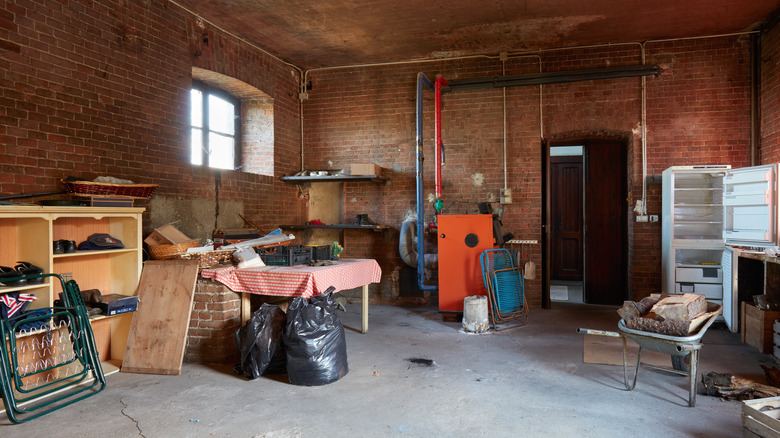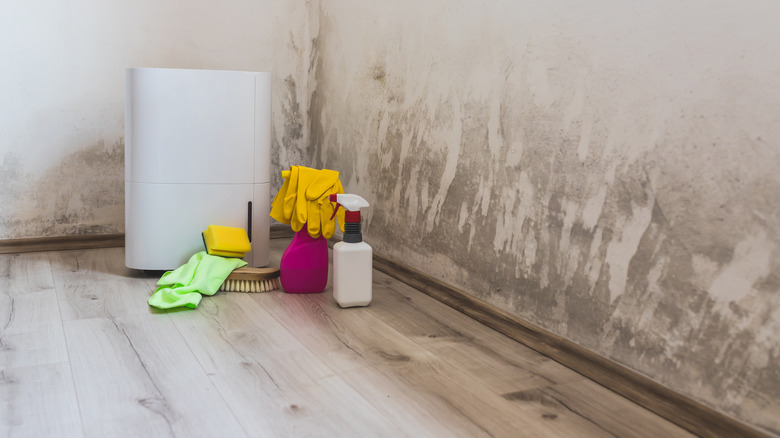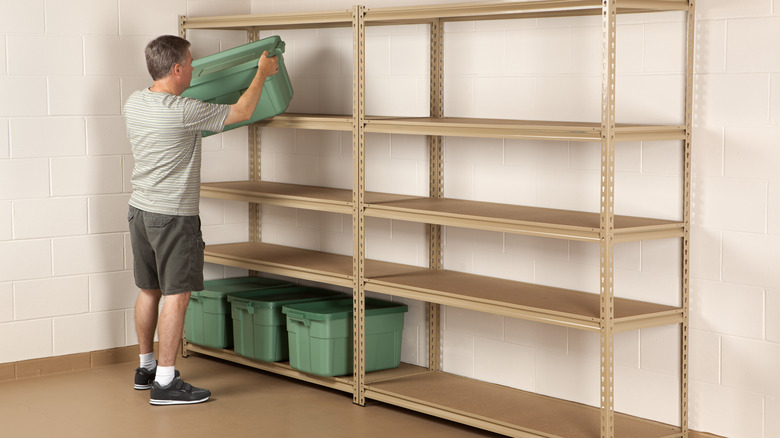Mistakes To Avoid When Cleaning Your Basement
We may receive a commission on purchases made from links.
The basement of your home can become a catch-all, a place to store just about anything and everything you don't need all the time. From holiday-themed décor to the kids' art projects from preschool, you have every unfinished project and just about anything else down there. When cleaned properly, the basement can be an excellent space for hobbies, an extension of your home's entertainment area, or an area you use for ample storage. However, there are two common mistakes people make when tackling this project: not addressing a moisture problem and not decluttering.
Make the best use of your finished basement by tackling what's lurking in this area once and for all. When you do, you'll add function to your home while also potentially improving the overall health of the space. Of course, it's also pretty helpful when you can easily find what you need because your basement is nice and organized.
Mistake: Ignoring a moisture problem
No amount of scrubbing the carpeting or painting the walls will make the basement a more comfortable space if you have a moisture problem. If your basement has a musty smell or a higher humidity level than other areas of your home, check for small amounts of moisture, whether it's under the rugs, behind the drywall, or dripping from a pipe behind a wall. Be sure to manage this problem before doing anything else with the basement since that moisture can increase the risk of mold and mildew growth in your space.
Determine if there's foundation damage or leaking pipes or if the home needs waterproofing along the exterior walls. If you cannot find the problem yourself, consider turning to a professional for a basement waterproofing inspection and estimate. You may need to update your foundation, seal the exterior walls, improve your sump pump, or invest in better ventilation. You can also install a dehumidifier to help control the moisture and humidity levels. Depending on the square footage of your space, these units run anywhere from a couple hundred dollars for smaller units to thousands for industrial models. Once you take these steps, make sure to sanitize your basement's surfaces (from ceiling to walls to flooring) to remove all of the mildew and mold risk. For example, consider using hydrogen peroxide for moldy basement walls, which you can buy on Amazon for as cheap as around $5. If you find significant areas of mold growth, consider hiring a mold remediation company to help you.
Mistake: Not decluttering
Don't make the mistake of not clearing away all of the extra stuff in your basement and organizing it. The more stuff you store here, the less room you have to make sure the space stays clean. Decluttering offers a number of benefits to the home as a whole. It can help free up some space to use for other needs, help free up your mind, and help improve your health, too, especially if it means limiting the number of pests in your home. Also note that too much stuff in the basement can become a fire risk, especially if an old electrical system or furnace is present.
But how do you effectively declutter? It's a real problem when you know you need or want to keep items and have limited time to organize them. Set up a weekend to pull everything out of the basement, one room at a time, and organize it. Tackle the problem with friends or over a longer period if you have to. Aim to remove as much from the basement as possible, with the goal of being able to use this space for other needs. Work through sections of your basement with authority, knowing you're making this area more habitable, sanitary, and useable. You can invest in totes to store items you must keep (they're as cheap as around $10 on Amazon), or just donate items to people who can repurpose and benefit from them right now.


